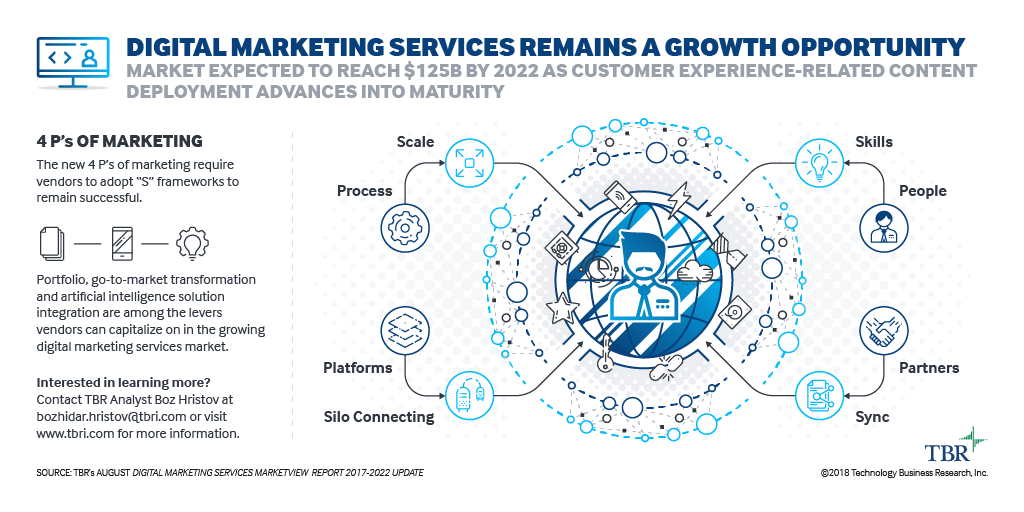The 4 P’s of marketing – people, process, partners and platforms – emerge behind AI and compel vendors to adopt S-centric frameworks
Market dynamics will evolve in the next 5 years, with voice and video the core conduits for trusted and tangible AI-based marketing campaigns
The digital marketing services (DMS) market will grow at a CAGR of 16.2% from 2017 to 2022, reaching $125 billion, as organizations across geographies adopt artificial intelligence (AI)-enabled, customer experience-based voice and video solutions to run outcome-based campaigns addressing business pain points beyond brand awareness. Marketing in the moment frameworks will continue to dictate the shift toward hyper-personalization as consumers’ attention becomes the new currency and creates opportunities in areas such as omnichannel delivery and intelligent operations.
The shift from brand awareness to activation and support results in four new P’s of marketing — people, process, partners and platforms — leading to data management issues and opportunities. Winning vendors can adopt “S”-centric frameworks that emphasize closing skills gaps, delivering at scale and being in sync with partners’ visions, and addressing customer data silos through the development of interoperable and secure solutions.
Portfolio and go-to-market transformation and AI solution integration will be among the levers vendors can use to capitalize on a growing DMS market. Feeding the hype of AI could be a double-edged sword if technology and services vendors cannot deliver on the promise to shift the perception of marketing from a cost center to a business value driver.
AI-based voice and video platforms will increasingly take center stage as enablers for delivering campaigns in hybrid marketing environments, helping brands better connect consumers’ offline and online professional, purchasing and social behavior data. Technology partnerships and expertise in integrating platforms such as IBM Watson, Google and Adobe Sensei in the business-to-business segment and Amazon Echo and Google Home in the business-to-consumer segment will be key to services vendors’ success. The inability of vendors to recruit and retain talent with skills in these technologies might hinder market share as vendors are unable to address tasks at speed. Lastly, within the next two years, the broad-based adoption of AI across omnichannel platforms will reduce the need for multiple vendors to support engagements, and will also result in new opportunities in intelligent marketing operations.
For more information, contact Senior Analyst Bozhidar Hristov ([email protected]).


Leave a Reply
Want to join the discussion?Feel free to contribute!